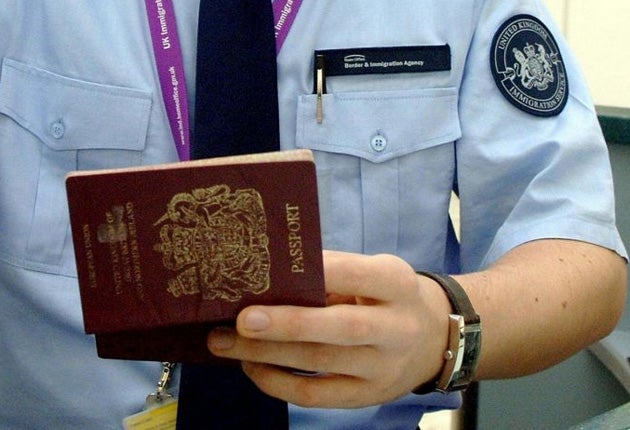Welfare groups condemn minister's pledge on migrants
Phil Woolas's promise to make it harder for foreign workers to settle in Britain sparks fury

Your support helps us to tell the story
From reproductive rights to climate change to Big Tech, The Independent is on the ground when the story is developing. Whether it's investigating the financials of Elon Musk's pro-Trump PAC or producing our latest documentary, 'The A Word', which shines a light on the American women fighting for reproductive rights, we know how important it is to parse out the facts from the messaging.
At such a critical moment in US history, we need reporters on the ground. Your donation allows us to keep sending journalists to speak to both sides of the story.
The Independent is trusted by Americans across the entire political spectrum. And unlike many other quality news outlets, we choose not to lock Americans out of our reporting and analysis with paywalls. We believe quality journalism should be available to everyone, paid for by those who can afford it.
Your support makes all the difference.Britain's new immigration minister was accused yesterday of leading a "baying pack" after he suggested the growing economic crisis could force a reduction in the number of migrants allowed into the UK.
In his first public statement in his new position, Phil Woolas conceded that immigration became an "extremely thorny" issue during an economic downturn when people already living in this country were losing their jobs. He also pledged the Government would respond by making it even harder for non-European Union nationals to come to Britain to work and live.
His warning was condemned by immigrant welfare organisations, who claimed the move towards quotas conflicted with the Government's settled policy on migration, which included the recently introduced "points-based" entry system. Keith Best, chief executive of the Immigration Advisory Service, said: "Whenever we face a recession, poor old migrants get the blame, but I don't think I was expecting a newly appointed minister to lead the baying pack."
Keith Vaz, Labour chairman of the Home Affairs Select Committee, said he would be astonished at a Labour immigration minister "in effect, changing the policy". "His predecessor and the Home Secretary have made it clear they do not support a quota," he said.
Immigration has consistently been a politically sensitive issue for New Labour for the past decade. Although a series of immigration reviews reduced numbers of new citizens settling in the UK every year, official figures show that the population grew by nearly two million – to almost 61 million people – between 2001 and 2007.
Mr Woolas has made it clear the Government will not allow it to continue rising without restraint, particularly with the economy in difficulties. "It's been too easy to get into this country in the past and it's going to get harder," he told The Times. "If people are being made unemployed, the question of immigration becomes extremely thorny. This Government isn't going to allow the population to go up to 70 million. There has to be a balance between the number of people coming in and the number of people leaving."
His warning that the Government planned to "break the link" between people coming to work and subsequently gaining citizenship was welcomed by pressure groups and MPs who have been demanding action to limit the number of people allowed to settle in the UK.
The Labour MP Frank Field claimed Home Secretary, Jacqui Smith, had signalled a plan for fresh limits at a meeting earlier this month. "It is long overdue, but it is clear the Government is moving towards a new position on immigration and it will be the first government whose views on immigration reflect the views of the overwhelming majority of the British public," Mr Field said. "What matters now is delivery. If our population is to be stabilised, immigration must be substantially reduced. For a start, we need to end the virtually automatic right of those who come on work permits to settle permanently in Britain."
Sir Andrew Green, chairman of the pressure group Migrationwatch, said the minister's intervention "could be a significant turning point". "I think the economic crisis has shown up the weakness of uncontrolled immigration. This is the very first time that a government minister has recognised the link between immigration and population. The Government has been in denial about that for years," he said.
The shadow Home Secretary, Dominic Grieve, said: "We have been calling for immigration limits for years but the Government has repeatedly poured scorn on this. It appears it now realises just how out of touch it is."
Join our commenting forum
Join thought-provoking conversations, follow other Independent readers and see their replies
Comments